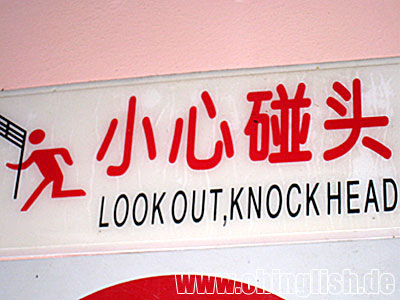
哇!What an interesting way to start the new year. This sign with its full name of 《卢湾区窗口服务与商业发展指挥部世博双语指南》(approximately: World Expo Bilingual Compass (issued by) Luwan District Commercial Development Headquarters) is a great window into the Chinese mind (at least into the one that deemed this sign necessary).
Clearly nothing (substantially) wrong with the English here. But using Chinese characters as a phonetic crutch to teach English pronounciation is a fascinating phenomenon. I thought this particular concept to be dead and buried, though. Clearly, I was wrong.
Here's a Pinyin transcription:
Welcome to our store! - weierkangmu tu aowo sidao!
Good morning - gude maoning
Good afternoon - gude afutenu
Good evening - gude yifuning
Can I help you? - kan ai hai'erpu you?
I'm sorry, I can only speak a little English. - anme saorui, ai kan wenglei sibike e leitou yinggelishi.
Just moment, please. - jiesite moumente pulisi
I'll find our colleague for help. - ai wei'o fande awo kaolige fou hai'erpu Bye Bye! - bai bai
It's interesting to see that the Chinese phonetic transcription itself isn't consistent: in the first sentence the sign makers are using "澳窝 aowo" for "our" (welcome to our store) while in the last line they were voting for "阿窝 awo" (I'll find our colleague for help). It's a long sign, apparently.
Dear readers and Chinglish fans:
Please send me an original picture of this sign including its surroundings! Mail address is on the right.Jackpot question:
who is the target audience?
Many sankesi!



















